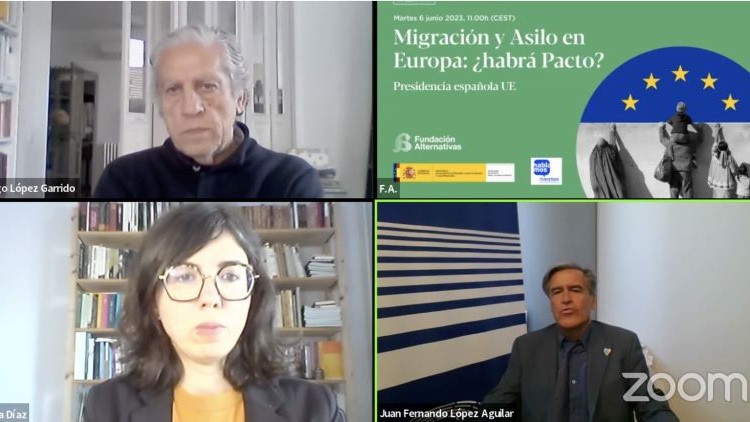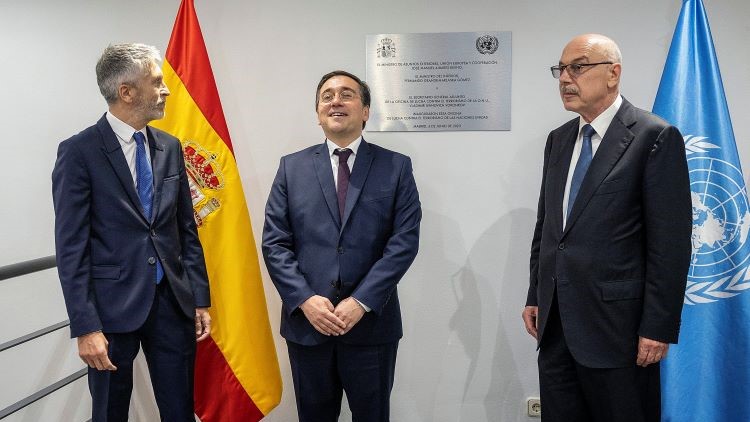The Diplomat
The need for a European pact on migration and asylum that binds all EU Member States is going to be one of the central issues of the imminent Spanish Presidency of the Council of the Union, but this will require overcoming the “difference of interests” between the “most affected” countries, such as Spain, and the northern states that do not share the “principle of solidarity”.
This is one of the main conclusions of the telematic debate organized yesterday by the Alternativas Foundation under the title Migration and Asylum in Europe: will there be a pact?, in which several experts called on Spain to finalize the Pact on Migration and Asylum during its Presidency of the EU so that it can be finalized before the European elections of 2024.
According to Juan Fernando López Aguilar, former Minister of Justice, Socialist MEP and President of the Committee on Freedoms, Justice and Home Affairs of the European Parliament, the Canary Islands route to the EU, “the deadliest of all”, is an example of the “resounding failure” to comply with European law in this area by several Member States “concerted for it”, which have been indifferent to the sum of “infringement proceedings, millionaire fines or convictions by the Court of Justice”.
In his view, Europe needs – after the migration and asylum system proposed in September 2020 by Ursula von Der Leyen’s European Commission – a new regulatory framework that strikes a “proper balance” between five legislative objectives: the replacement of the Dublin Regulation (which establishes the criteria and mechanisms for identifying which Member State is responsible for examining an asylum application submitted by a third-country national), the implementation of a crisis status for “when a Member State is unable to manage the common right of asylum”, the updating of Eurodac (the European fingerprint database to identify asylum seekers and irregular border crossers), the adoption of a protocol for external border controls (Screening) and the improvement of the regulation on common procedures and guarantees.
For her part, Nuria Díaz, coordinator of Incidents and Communication of the Spanish Refugee Aid Center (CEAR), warned that the Spanish Presidency of the EU has a “great challenge ahead” because the negotiations on the pact should be “closed before May of next year”, the date on which the European legislature ends. “Not just any pact will do, and the Spanish Presidency must make progress on a new guaranteeing agreement with refugees and migrants that finally makes the principle of solidarity between Member States, as well as that of shared responsibility, a reality,” she added.
According to Díaz, the Dublin Regulation on the allocation of responsibilities for reception “does not work” because it “does not balance the responsibilities” between the Member States and is based on “this sole criterion of assigning responsibility to the first country of entry”. Likewise, she continued, the Commission’s proposal is an “à la carte system” in which countries can choose whether to contribute through “relocation commitments, private sponsorship of returns and reinforcement of the capacities of the host country”, when the establishment of the “solidarity mechanism” between Member States is the “central issue of the problem”.
In the opinion of the executive vice-president of the Alternativas Foundation, Diego López Garrido, migration and asylum are going to be “the great challenge” in the Spanish Presidency of the EU, since “many years” have been spent pursuing a pact for human rights to be “regulated and governed” by the EU as a whole, and not as it has been until now, which is an “exclusively national competence with some small contributions from European law”.
In his opinion, this is a “pending issue” that clashes with the “reluctance and resistance” to migration and asylum that exist in each of the Member States. According to López Garrido, Spain is one of the countries “most affected” by the arrival of African citizens crossing the Mediterranean, which has become a “cemetery”, but faces the attitude of the countries further north, which, without so much migratory pressure, are not so willing to “share responsibilities for resettlement and management”. For this reason, and within this “difference of interests”, several northern states do not share the “principle of solidarity” between EU member countries.







